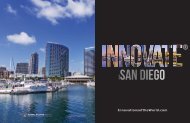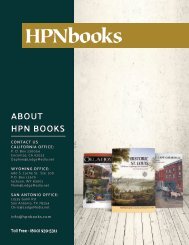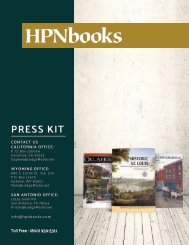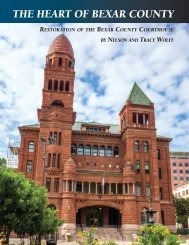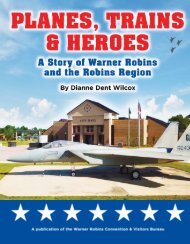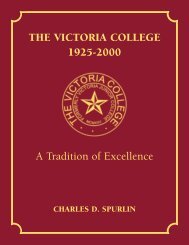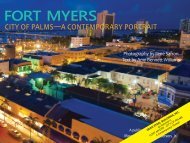In The Cradle of Industry and Liberty
An illustrated history of Philadelphia's manufacturing sector paired with the histories of local companies that make the city great.
An illustrated history of Philadelphia's manufacturing sector paired with the histories of local companies that make the city great.
Create successful ePaper yourself
Turn your PDF publications into a flip-book with our unique Google optimized e-Paper software.
While other manufacturing centers were<br />
known for large-scale production <strong>of</strong> st<strong>and</strong>ardized<br />
lesser-quality goods, Philadelphia was<br />
known for its specialty companies <strong>and</strong> its<br />
skilled workforce that made a wide variety <strong>of</strong><br />
high-quality products, from fine clothing to<br />
precision medical instruments to specialized<br />
tools <strong>and</strong> machine parts. Many <strong>of</strong> these<br />
companies were family-owned <strong>and</strong> operated<br />
firms rather than publicly traded corporations,<br />
<strong>of</strong>ten remaining in the family through<br />
multiple generations. Philadelphia’s high<br />
percentage <strong>of</strong> such family firms is yet<br />
another defining characteristic <strong>of</strong> its manufacturing<br />
history.<br />
<strong>The</strong> wide range <strong>of</strong> its manufacturers<br />
notwithst<strong>and</strong>ing, certain industries grew to be<br />
especially large <strong>and</strong> important in Philadelphia<br />
<strong>and</strong> came to be closely identified with the city.<br />
Among these were textiles, iron <strong>and</strong> steel,<br />
ship <strong>and</strong> locomotive building, <strong>and</strong> food processing.<br />
<strong>In</strong> certain industries, such as textiles<br />
<strong>and</strong> metal working, it was the sheer number<br />
<strong>and</strong> range <strong>of</strong> sizes <strong>of</strong> companies that is striking.<br />
<strong>The</strong>re were some 700 individual textile<br />
companies <strong>and</strong> 660 metal working shops in<br />
Philadelphia around the turn <strong>of</strong> the twentieth<br />
century, for example. Some were quite large,<br />
with thous<strong>and</strong>s <strong>of</strong> employees, but most were<br />
much smaller, employing anywhere from a<br />
few to a few hundred workers.<br />
For most people, Philadelphia’s storied<br />
manufacturing history is best represented by<br />
the h<strong>and</strong>ful <strong>of</strong> industrial giants it produced:<br />
iconic firms such as Baldwin Locomotive,<br />
Cramp Shipyard, Stetson Hat, Disston Saw,<br />
@<br />
Above: <strong>The</strong> Bridesburg Machine Works<br />
<strong>of</strong> Alfred Jenks & Son, 1856. Jenks was a<br />
longtime family-run firm in Bridesburg that<br />
manufactured specialty cotton <strong>and</strong><br />
woolen machinery.<br />
LIBRARY COMPANY OF PHILADELPHIA.<br />
Below: Two <strong>of</strong> Philadelphia’s major<br />
nineteenth-century iron founders are shown<br />
in this 1856 print: I. P. Morris & Company<br />
on the Delaware River in Port Richmond<br />
<strong>and</strong> Merrick & Sons Southwark Foundry<br />
at Fifth Street <strong>and</strong> Washington Avenue<br />
in Southwark.<br />
LIBRARY COMPANY OF PHILADELPHIA.<br />
CHAPTER ONE<br />
11




